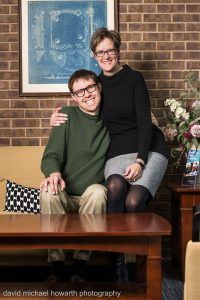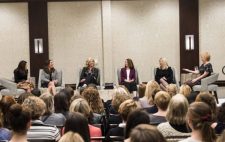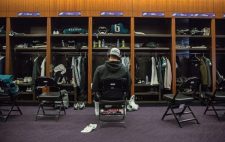 When Will Hoheisel was a child, the films he loved – the ones he watched over and over again – helped him figure out how to relate to people in the real world.
When Will Hoheisel was a child, the films he loved – the ones he watched over and over again – helped him figure out how to relate to people in the real world.
“A lot of his sentences were lines he memorized from the movies,” recalls his mother Jennifer Hoheisel, a professor at Camden County College (CCC). “And when he was really little, we used to call him ‘Mr. Noun,’ because he could label objects, but he couldn’t put them into original sentences.”
Diagnosed with autism as a 3-year-old, “Mr. Noun” is now 25, and things are very different these days. Some five years ago, Will began speaking publicly about his life so others could understand what it’s like to be autistic.
His public appearances started when he was a student at CCC and would accompany his mother to workshops about autism at the college. Jennifer, who presents an introductory seminar, would stick to the more technical aspects about Autism Spectrum Disorder (ASD); Will would talk about his life, particularly how his passion for movies led him to his film major. In his talks today, the Haddon Heights resident also describes his fulltime job as a receptionist at Bancroft in Cherry Hill, his engagement to fiancé Mandy Mainart and the couple’s quest to purchase a condominium to time with their October nuptials.
Will’s contributions are always show stealers, says Jennifer, who recently stepped down as coordinator of the Autism Initiative for The Center at CCC.
“Across the board people say how much it means to hear directly from Will,” she says, noting that attendees often come up to him after the presentations for career or dating advice. “He is able to represent a lot of people who don’t have those speaking skills yet.”
Mother and son upped their game two years ago with a new addition to the repertoire called “Autism Goes to the Movies.” Drawing from his academic training, Will curated film clips that realistically show a range of experiences of people diagnosed with ASD. He includes major films like 1988’s “Rain Man”
starring Dustin Hoffman and 2010’s “Temple Grandin” with Claire Danes as the famed animal husbandry expert, as well as lesser known independent movies.
“On more than one occasion, these clips helped me with both understanding myself and being comfortable in my own skin,” says Will.
The mother-son duo believed screening movie clips at workshops would illustrate a far greater understanding of people on the spectrum than they could possibly present by simply talking about their own lives, he adds.
As Will says during his workshops: “If you’ve seen one person with autism, then you’ve seen one person with autism.”
“For example, even though ‘Rain Man’ features a great example of a character who has autism, he is only one person. Just because he has traits or habits associated with people on the spectrum, it doesn’t mean it’s exactly the same for someone else,” Will explains. “I would even go as far as to say that, despite some similarities, people with ASD are just as vast and different as the rest of the human race is.”
Will and his mom first presented Autism Goes to the Movies at CCC in 2017 to rave reviews. It has since been reprised twice at the Katz JCC. There have been requests for encores, a suggestion the mother and son take the show on the road, and even those encouraging Will to turn his many ideas for original movies into reality. The support is certainly flattering, but as Will notes, all movie projects are on hold for the year due to wedding and happily-ever-after planning.
“We have shifted our focus,” he says.
Love, marriage, college, a full-time job and the lecture circuit? These are all milestones that long ago seemed beyond expectations, admits Jennifer. How Will overcame odds is covered in the workshops, but the short answer – says Jennifer – is that he worked extremely hard every step of the way.
“We were extremely lucky in that regard,” she says. “It was a lot of work and Will was willing to work super hard.”
The oldest of the Hoheisel’s two boys, Will was diagnosed in 1996 when the family lived in Ohio. This was a time before early interventions for autistic children were considered standard practices. Fortunately, Will’s psychologist was on the cutting edge of autism education, and Jennifer was committed to doing whatever it would take to help her child.
“I hired four education majors to set up a school, and the five of us worked with him every day,” says Jennifer.
When it came time for formal schooling, the family was at a crossroads, trying to choose between moving to California or New Jersey for what they considered the best care. New Jersey won out – and the family, which by then included Will’s younger brother Luke, headed East.
This turned out to be a good move by all accounts. Will’s father, Rev. Eric Hoheisel, until recently served as the minister of Oaklyn Baptist Church. He is now a regional minister of the American Baptist Church New Jersey.
Jennifer, on the CCC faculty since 2000, is the director and founder of the college’s honors program. A philosophy professor, she spent 11 years as the coordinator of the autism initiative, presenting a variety of free autism-related talks for students, educators and families with members touched by autism. Although she stepped down this year, she and Will still plan to give their Spring lecture April 2 on the Camden campus.
Will and Luke, 22, both love movies – watching them and making them. Luke, a 2018 Rutgers graduate, was more into the writing while Will liked being behind the camera. As kids, they created Puppeteria, movies starring their puppets and stuffed animals shot on a Canon camera that a neighbor sold to them for $10.
Although officially on hiatus from movie making, Will never stops coming up with ideas for creating educational and entertaining video content for the autism community. In fact, his Google doc of film ideas is 113 pages long.
When he was compiling ideas for Autism Goes To the Movies, the challenge was narrowing all his ideas into 14 or so clips. One that made it to the final cut was a scene from the documentary “How to Dance in Ohio” in which Jessica, a young woman, gets upset over “constructive criticism” during her on-the-job training as a receptionist at an autism center.
For Will, that’s so relatable.
“Constructive criticism is one of those situations that blurs the lines a little bit because, even though what your boss or job coach says to you is meant to be supportive, he speaks in a serious tone that sounds like he’s angry,” Will says.
In the clip, Jessica tears up because she thinks she’s bad at her job.
“I myself have had moments while taking job coaching sessions where I was emotionally making a big deal about something that probably wasn’t a big deal,” he says. “So I completely sympathize with Jessica’s situation.”
For Jennifer, the fact that Will is not only taking charge of his own future, but can be a voice to help others with ASD, is amazing.
“This is a boy who didn’t even speak an original full sentence until he was 5,” she says. “Now he’s giving public talks and answering phones at Bancroft. It’s awesome beyond what I could have dreamed when we first started.”














